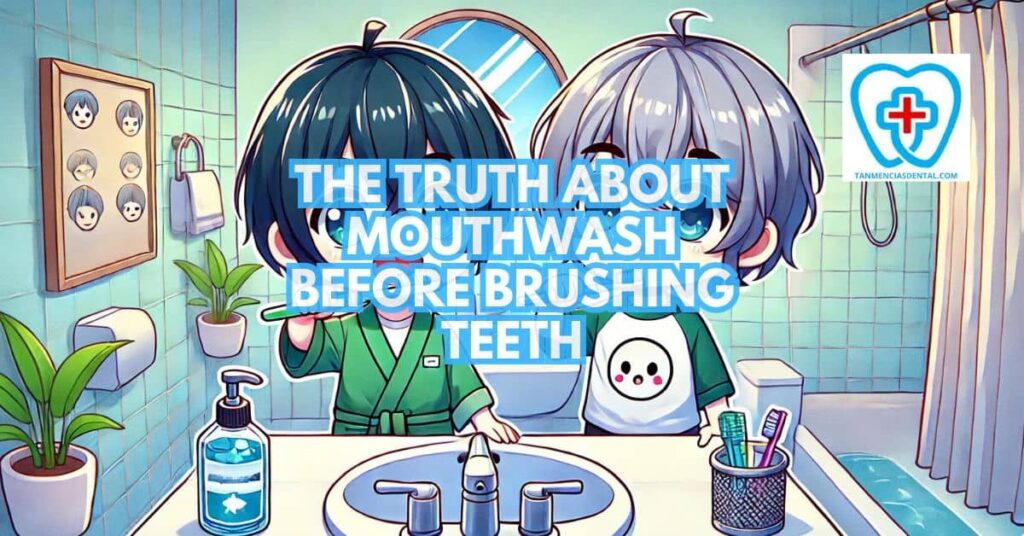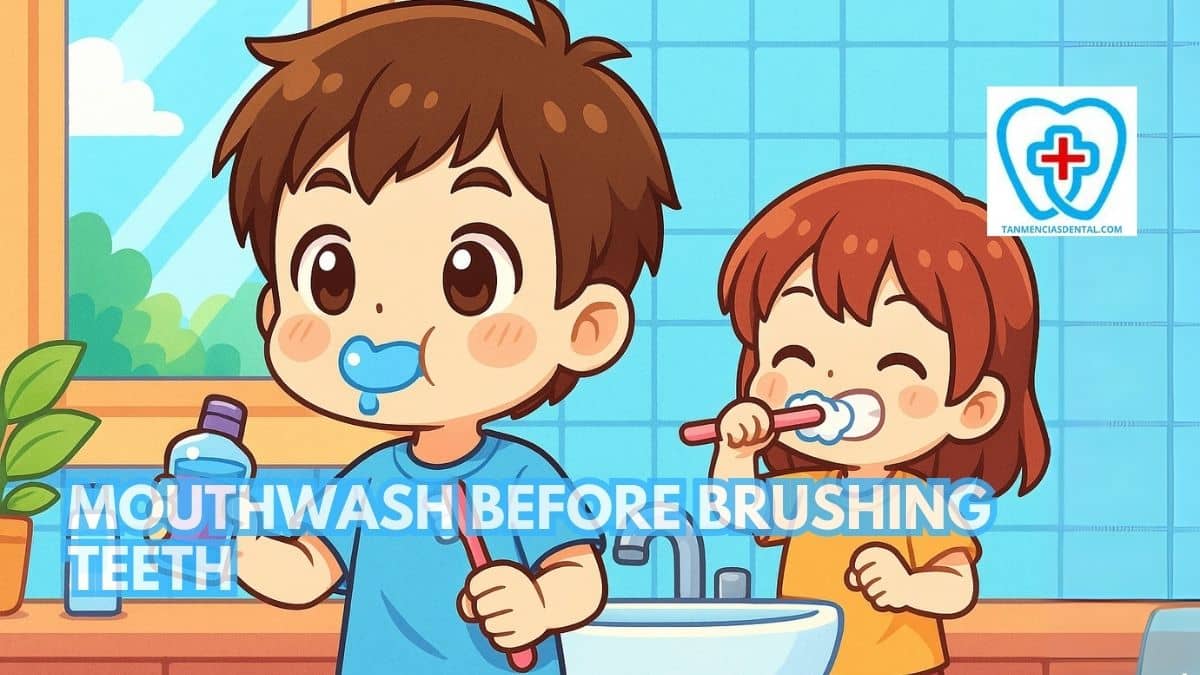Using mouthwash before brushing teeth is a question that often leaves people unsure of the right answer.
Some studies and experts suggest that rinsing first may loosen plaque and make brushing easier.
Others point out that it could reduce the benefit of fluoride from toothpaste if the order is not considered carefully.
Knowing the possible pros and cons helps you make a choice that fits your oral health needs.
We’ll explain what science and dental professionals say about mouthwash, brushing, and the best way to combine them.
1. Brushing and Flossing: The Unshakeable Foundation
Brushing and flossing are the cornerstones of a healthy oral hygiene routine.
Brushing twice a day with fluoride toothpaste removes plaque and food particles from the surface of your teeth.
Flossing once a day helps clean between teeth and along the gumline, where a toothbrush can’t reach.
These practices help prevent cavities, gum disease, and bad breath.
Consistency in brushing and flossing is essential for maintaining overall oral health.
🦷 Why Understanding Dentist Vs Oral Surgeon Roles Matters for Your Oral Health
2. Mouthwash: The Reliable Backup
Mouthwash serves as a valuable addition to your oral care regimen.
It helps reduce the number of bacteria in your mouth, which can prevent plaque buildup and gum disease.
Many mouthwashes contain antiseptic ingredients that kill germs on contact, providing a cleaner feeling.
Additionally, mouthwash can freshen your breath, making it a reliable backup to brushing and flossing.
For those with specific oral health issues, mouthwash can offer targeted benefits such as reducing inflammation or providing extra fluoride.
🦷 Is Your Smile Worth It? Why Dental Care Is So Expensive
3. Alcohol-Based vs Alcohol-Free Mouthwash
Alcohol-based mouthwash can kill many germs but may also dry out the mouth.
A dry mouth makes it harder for saliva to protect teeth from cavities.
Alcohol-free options are gentler and still help reduce bacteria while freshening breath.
Individuals with sensitive mouths or frequent dryness may derive greater benefits from alcohol-free rinses.
Knowing the difference can help you choose the type of mouthwash that best supports your oral health.
🦷 Does Salt Water Help With Gingivitis? The Salty Truth About Gum Relief
4. Pre-Brushing Mouthwash: A Potential Advantage?
Using mouthwash before brushing can offer several potential advantages.
It can help loosen food particles and plaque, making brushing more effective at removing these substances.
Pre-brushing mouthwash may also reduce the bacterial load in your mouth, which can enhance the cleaning power of your toothbrush and toothpaste.
This approach can be particularly beneficial for individuals with higher plaque levels or gum disease.
However, it’s essential to choose a mouthwash that complements your toothpaste to avoid washing away beneficial ingredients like fluoride.
🦷 Can You Drink Sparkling Water After Brushing Your Teeth?

5. Brushing First? The Fluoride Factor
Brushing your teeth first ensures that the fluoride in your toothpaste remains on your teeth longer.
Fluoride is a key ingredient that strengthens enamel and helps prevent cavities.
If you use mouthwash immediately after brushing, it may rinse away some of the fluoride, reducing its effectiveness.
To maximize the benefits of fluoride, consider waiting at least 30 minutes after brushing before using mouthwash.
This waiting period allows the fluoride to fully penetrate and protect your teeth.
🦷 Why Be a Dental Assistant? It’s More Than Just Smiles!
6. Expert Opinions: Brushing vs. Mouthwash – The Order Debate
Dental experts have varying opinions on whether to use mouthwash before or after brushing.
Some suggest that using mouthwash first can loosen plaque and food particles, making brushing more effective.
Others argue that brushing first allows fluoride from the toothpaste to stay on the teeth longer, providing better protection against cavities.
Research on this topic is still ongoing, and recommendations may vary based on individual oral health needs.
Consulting with your dentist can provide personalized advice tailored to your specific situation.
🦷 How Smile Correction Can Transform Your Confidence and Appearance
7. Mastering the Moves: The Importance of Proper Brushing Technique
Proper brushing technique is crucial for maintaining optimal oral health.
Use a soft-bristle toothbrush to avoid damaging your gums and enamel.
Brush in gentle, circular motions for at least two minutes, ensuring you cover all surfaces of your teeth, including the front, back, and chewing surfaces.
Don’t forget to brush your tongue, as it can harbor bacteria that cause bad breath.
Consistently practicing good brushing technique can significantly improve your oral hygiene.
🦷 Chewing Gum Instead of Brushing Teeth: Can Gum Really Save the Day?
8. When Pre-Brushing Mouthwash Might Shine
Pre-brushing mouthwash might be especially beneficial for individuals with certain oral health conditions.
For those with gum disease, using mouthwash before brushing can reduce the bacterial load and inflammation in the mouth.
It can also help individuals with braces or other orthodontic appliances by loosening debris that gets trapped in hard-to-reach areas.
In addition, pre-brushing mouthwash can be useful for people who frequently experience bad breath, as it helps to neutralize odor-causing bacteria.
Choosing the right mouthwash for your specific needs can enhance the effectiveness of your oral hygiene routine.
🦷 Brushing Up on Prevention: Can Tooth Decay Be Reversed or Only Prevented?
9. Fluoride-Free for Before Brushing?
Using a fluoride-free mouthwash before brushing can be a strategic choice.
This approach ensures that you gain the benefits of mouthwash without rinsing away the fluoride from your toothpaste.
Fluoride-free mouthwashes often contain antiseptic ingredients that reduce bacteria and freshen breath.
This can set the stage for a more effective brushing session.
Always check the ingredients to ensure the mouthwash aligns with your oral health goals.
🦷 Why Brushing Your Teeth At Night Is More Important Than You Think
10. Brushing Isn’t the Only Time to Use Mouthwash
Mouthwash can be beneficial at different times throughout the day, not just during your brushing routine.
Using mouthwash after meals can help reduce food particles and bacteria, preventing plaque buildup and bad breath.
It’s also handy before social events for a quick breath refresh.
Some people find that using mouthwash in the morning and evening works best for maintaining a clean mouth.
Experiment with different times to find what works best for you.
🦷 Orthodontic Treatment in Marikina
11. Your Dentist: The Ultimate Guide for Your Oral Hygiene Journey
Your dentist is the best resource for personalized oral hygiene advice.
They can assess your specific needs and recommend the most effective mouthwash and brushing routine for you.
Regular dental checkups allow your dentist to monitor your oral health and make adjustments to your care plan as needed.
Don’t hesitate to ask questions about mouthwash use during your visits.
Your dentist’s guidance is invaluable in ensuring you maintain optimal oral health.
🦷 Oral Health Specialists in Marikina City
👨⚕️ Conclusion
Deciding whether to use mouthwash before or after brushing ultimately depends on your personal preferences and oral health needs.
Both approaches offer distinct benefits, from enhanced plaque removal to maximizing fluoride protection.
Consulting with your dentist can help you tailor a routine that best supports your oral hygiene goals.
Remember, the key is consistency and proper technique in all aspects of your dental care.
Choose the method that fits seamlessly into your lifestyle and promotes your overall oral health.
😊 Self-Promotion
Visit Tan-Mencias Dental Clinic in Parang, Marikina City, for exceptional dental care in a friendly and welcoming environment.
Our dedicated team is ready to help you achieve your best smile.
For any questions or to book an appointment, you can call us at 9171451074, message us on our Facebook page, or use our website’s contact form.
We look forward to assisting you with all your dental needs.
Your smile is our top priority!
❔ FAQs
1. Should I use mouthwash before or after brushing my teeth?
Both ways can work, but they give different benefits.
Using mouthwash before brushing may loosen food and plaque.
Brushing first allows fluoride from toothpaste to stay on your teeth longer.
If you use both, try to wait at least 30 minutes after brushing before rinsing with mouthwash.
2. Can mouthwash replace brushing and flossing?
No, mouthwash cannot replace brushing and flossing.
Brushing removes plaque and food particles from tooth surfaces, while flossing cleans between teeth.
Mouthwash can help reduce bacteria and freshen breath, but it should be seen as an extra step.
For healthy teeth and gums, brushing and flossing are still the foundation.
3. Is alcohol-free mouthwash better than alcohol-based mouthwash?
It depends on your needs.
Alcohol-based mouthwash kills germs effectively but may dry out your mouth.
Alcohol-free mouthwash is gentler and helps people who have dry mouth or sensitive gums.
Choosing the right one depends on your comfort and your oral health condition.
4. How often should I use mouthwash?
Most people benefit from using mouthwash once or twice a day.
Using it too often may irritate your mouth or reduce the natural role of saliva.
Morning and evening are common times that fit easily into daily routines.
If you have special dental needs, ask your dentist how often you should use mouthwash.
5. Is mouthwash safe for children?
Mouthwash is usually not recommended for children under 6 years old.
Young children may swallow it, which can be unsafe.
For older children, alcohol-free mouthwash is often a better choice.
Always check with a pediatric dentist before giving mouthwash to your child.

